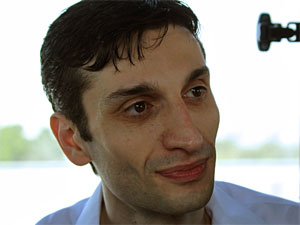


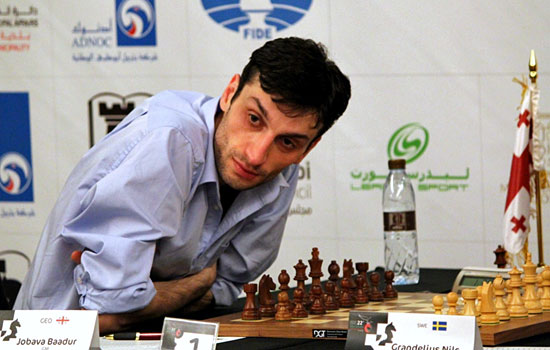
I waited in anticipation outside the ballroom of Sofitel Hotel, where the closing ceremony of the Abu Dhabi Open was about to begin. I wanted to get in a word with Baadur Jobava before that. I saw him walking towards me from a distance – a tall and lean figure. I went up to him and said, “Hi Baadur, I am Sagar Shah and I would like to interview you for the ChessBase news page.” “Why not!” he replied instantaneously. “But I am going to be busy tonight partying with my friends. Why don’t we do it tomorrow?” I explained to Baadur that I had to leave tomorrow afternoon to Dubai to catch my flight to Mumbai. The organizers were providing us with a bus for this 150 kilometer journey from Abu Dhabi to Dubai, which would last around two hours. “I also have to go to Dubai. So why don’t we make good use of our time and do the interview in the bus itself!” he said. I was more than happy with this opportunity and promised to reserve a seat for him on the bus next day.
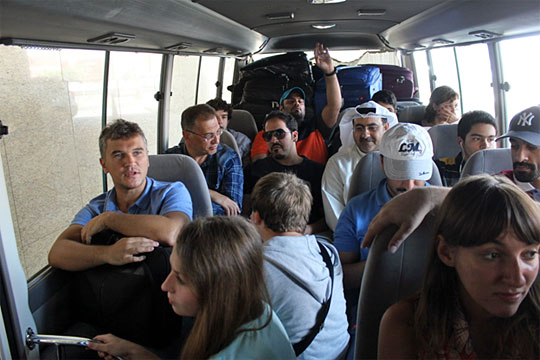
That bus turned out to be a mini-van that could accommodate just 20 people. But there were nearly 30 chess players who wanted to travel from Abu Dhabi to Dubai. We all somehow managed to cram ourselves inside. While many sat on the floor, I did my best to reserve a seat for Baadur. But where was he? Just when we were about to leave, he came running out of the hotel doors, got into the bus, took his seat and, as if nothing had happened, greeted everyone with customary enthusiasm. I heaved a huge sigh of relief. The settings were the just the kind you would expect when dealing with him – unconventional and completely original. As I began with my first question all the people in the bus turned their attention to the interview. It was a live show with one of the greatest creative geniuses the game has ever seen.

Lively and enthusiastic, on and off the board – that’s Baadur for you
Sagar Shah: Ok Baadur, before we go into history mode, how was your experience at the Abu Dhabi Masters 2015?
Baadur Jobava: [speaking like a radio jockey into my recording device] Welcome ladies and gentlemen. Hello from Abu Dhabi, we are on our way to Dubai and we are going to listen to some fantastic music! [Everyone laughs] Well what can I say, the conditions were excellent. It was a very serious and prestigious open. You had to work for every half point here. I would like to congratulate Nils for his victory. He fully deserves it. He lost the penultimate game against Areshchenko, but found his strength and won the last round facing Akopian. The tiebreaks favoured him and Martyn Kravtsiv, so they finished first and second respectively. Kravtsiv was a little lucky, he was able to checkmate Abhijeet Gupta in a roughly equal position in the eighth round, but then Gupta is also lucky sometimes! [Laughs- referring to the Al Ain Open 2013 where Baadur didn’t turn up for his last round game and Gupta won the first place.]
SS: Are you happy with how things went here?
BJ: Yes, I am gaining some rating points [12.4] and my quality of play was quite good. Although I was not in the best form, a shared first place is not something you need to complain about.
SS: So let’s start from the beginning. How did you start playing chess?
BJ: I was five years old and my brother four. Our father taught us the game of chess which is like a tradition in our family. My father knew chess, my mother played, and even my uncle did. It was hard not to be a chess player. I am thankful to my father – it was only because he taught me the game that today I can travel and enjoy and not have a job and a boss who will always tell me what to do!

Baadur Jobava (right) with his brother Beglar and mother Liana
in Tbilsi in 2009 [picture by Lela Javakashivili and Evgeny Surov]
So I learnt chess at the age of five. I played my first tournament in which, I still remember, I turned seven on the last day of that event. My father was my first and last coach. I have never had an official coach. Not until now.
SS: How did you work on chess when you were young?
BJ: I have always worked with classical books. They are so deep that at any age when you come back to these books you learn something new. For example: when you are forty and you read a Dostoevsky book you understand one side of it, and when you are sixty and you go through it again you discover the other side - always something new. My first chess book was on Alexander Alekhine by Kotov. Then there was one by Karl Schlechter – one of my favourite players and the uncrowned champion. You know what happened, right? He was plus one going into the last game of his match with Emanuel Lasker in 1910, but the rules dictated that he needed to be plus two. He overstretched and lost and thus never became the World Champion – quite a tragic story. Another book that I loved was by Botvinnik on his career which I would thoroughly recommend to young and dedicated players of the game. As for Yuri Averbakh’s books on the endgame, there is absolutely no doubt as to how good these really are. I do read modern books, but classical ones are much better I think.
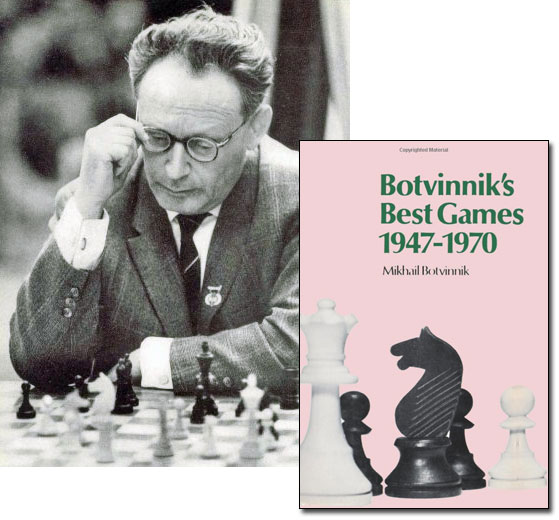
Botvinnik’ book on his best games is what Baadur recommends to all improving players
SS: Apart from chess what were you studying when you were young?
BJ: I was a normal kid. I went to school with my brother and we were in the same class. I studied in the first class in Georgia, and then moved to Ukraine where I finished school up to tenth grade. After that we came back to Georgia. From 1992-1999 I was in Ukraine. After my schooling I went to university and studied journalism.
SS: When did you decide to pursue chess professionally?
BJ: All I knew was that I never wanted to be a professional journalist. Actually I don’t like journalism at all!
SS: Then why study journalism at all?
BJ: I studied journalism because of the stupid Soviet mentality that you need a diploma. I studied journalism for my parents, not for myself. If I was given a chance I would have devoted more time to chess than going to university.
SS: When you were young and upcoming you were very theoretical, like your 34-move win against Bareev. And in the present day you are the one of the most creative players, just trying to avoid theory. What happened in the intervening years?
BJ: The game against Bareev was in 2003. At that time I was working very hard on chess and on my openings. Later I changed to another style – less emphasis on the first phase of the game and more to creative style of play. I don’t like this trend of blitzing out 25 to 30 moves of theory. When you are young and you have energy you are able to do it. But now this no longer interests me.
SS: So this game with Bareev, is this the best one that you have ever played?
BJ: I like many of the games that I have played in the past like the one against Zoltan Almasi from the European Championship 2010. It was a very interesting pawn sacrifice that led to a good knight versus bad bishop endgame. But it was not my sort of crazy style game. In 2004 I had played a game against Mircea Parligras which was also very interesting and contained many sacrifices. [Thinks for a while] But yes, the game against Bareev is definitely the best. I found d5 on my own at home without the use of an engine – the silicon monster can never find such an idea. Later I used the engine to build on my analysis. There is an interesting story behind this game: before the tournament I told my father that in the European Club Cup I might meet Bareev, who plays this line in the Caro Kann, and I will use this sacrifice against him. To which my father said, “Come on, there is no chance of that happening.” And after I executed the sacrifice and won the game my father was simply shocked! It was preparation right until the end.
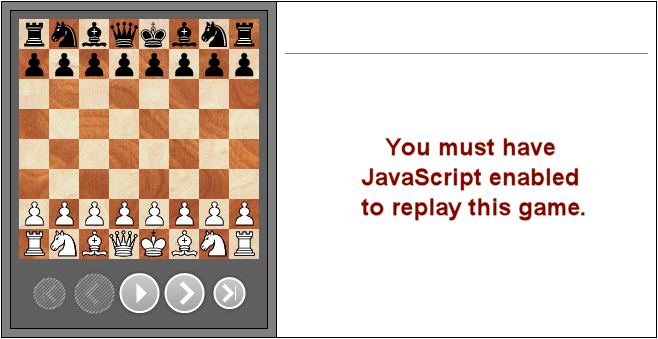
[Event "Calvia ol (Men)"] [Site "Mallorca"] [Date "2004.10.27"] [Round "12"] [White "Jobava, Baadur"] [Black "Grischuk, Alexander"] [Result "1-0"] [ECO "D17"] [WhiteElo "2614"] [BlackElo "2704"] [Annotator "Huebner,R"] [PlyCount "51"] [EventDate "2004.10.15"] [EventType "team-swiss"] [EventRounds "14"] [EventCountry "ESP"] [Source "ChessBase"] [SourceDate "2005.01.27"] [WhiteTeam "Georgia"] [BlackTeam "Russia"] [WhiteTeamCountry "GEO"] [BlackTeamCountry "RUS"] 1. d4 d5 2. c4 c6 3. Nf3 Nf6 4. Nc3 dxc4 5. a4 Bf5 6. Ne5 Nbd7 7. Nxc4 Qc7 8. g3 e5 9. dxe5 Nxe5 10. Bf4 Nfd7 11. Bg2 g5 12. Bxe5 Nxe5 13. Qd4 f6 (13... Nxc4 14. Qxh8 O-O-O 15. O-O Nd2 16. Rfd1 Be7 17. Qg7 Bc2 18. Qxf7 $18) 14. O-O-O { This is the novelty which had been found by Baadur and used first in his game against Kulaots Kaido just a month ago.} (14. Nxe5 Qxe5 (14... fxe5 15. Qe3 Be7 16. Be4) 15. Qxe5+ fxe5 16. O-O (16. Be4 Be6 17. O-O-O $11) 16... O-O-O 17. Be4 Be6 $15) 14... Be7 15. Ne3 Be6 16. Qe4 Bb3 17. Rd2 O-O 18. h4 gxh4 $2 (18... Bc5 19. hxg5 fxg5 20. Ng4 Nxg4 21. Qxg4 Bxf2 22. Qxg5+ (22. Be4 Be3 23. Rxh7 Rf1+ 24. Nd1 Rxd1#) 22... Qg7) 19. Qxh4 Rf7 (19... Bc5 20. Ng4 Nxg4 21. Qxg4+ Qg7 22. Qf5 Bb6 23. a5 Bc7 24. Rh4 Bf7 25. a6 bxa6 26. Be4 Bg6 27. Qe6+ Qf7 28. Qxf7+ Bxf7 29. Bxh7+ Kg7 30. Rd7 Bb6 31. Bf5) 20. Nf5 Kh8 (20... Bf8 21. Ne4 Bd5 22. Ne3 Ng6 (22... Bxe4 23. Bxe4 Kh8 24. f4) 23. Nxf6+ Kh8 24. Qg5) 21. Be4 Raf8 $6 (21... Bb4 22. Nh6 Rg7 23. Qxf6 (23. Bxh7 Bxc3 24. Nf7+ Nxf7 25. bxc3 Qe5 26. Bc2+ Kg8 27. Bxb3 Qxc3+ 28. Bc2 Qa1+ 29. Bb1 b5) 23... Rf8 24. Nf7+ Qxf7 25. Qxe5 Kg8 26. Rh4) 22. f4 $18 Nc4 23. Ng7 Rxg7 24. Bxh7 f5 25. Qh5 Bh4 26. Bxf5+ 1-0
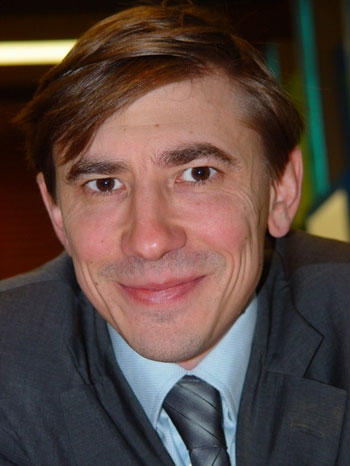
On the receiving end of some world class home preparation was Evgeny Bareev
And I have played quite a few theoretical games like this – The game against Alexander Grischuk from Calvia Olympiad 2004 comes to mind.
The way I find these new ideas is that I work on the chessboard on my own and only later consult the computer. I am currently trying to find the best style, not to be too theoretical neither too creative. Having both of them in balance is the best. It might seem I am not too theoretical right now, but I am in the process of achieving the ideal style which will happen gradually.

[Event "EU-Cup 19th"] [Site "Rethymnon"] [Date "2003.10.04"] [Round "7.1"] [White "Jobava, Baadur"] [Black "Bareev, Evgeny"] [Result "1-0"] [ECO "B19"] [WhiteElo "2596"] [BlackElo "2721"] [Annotator "Sagar Shah"] [PlyCount "67"] [EventDate "2003.09.28"] [EventType "team-swiss"] [EventRounds "7"] [EventCountry "GRE"] [Source "ChessBase"] [SourceDate "2004.11.15"] [WhiteTeam "Tbilisi"] [BlackTeam "Sarajevo Bosna"] [WhiteTeamCountry "GEO"] [BlackTeamCountry "BIH"] 1. e4 c6 2. d4 d5 3. Nd2 dxe4 4. Nxe4 Bf5 5. Ng3 Bg6 6. h4 h6 7. Nf3 Nd7 8. h5 Bh7 9. Bd3 Bxd3 10. Qxd3 Ngf6 11. Bd2 e6 12. O-O-O Be7 13. Qe2 O-O 14. Kb1 c5 15. d5 $5 $146 {This is a very important novelty in the history of this entire variation.} exd5 (15... Nxd5 16. Ne4 $40 {[%cal Gg2g4]}) 16. Bxh6 gxh6 17. Nf5 Re8 18. Nxh6+ Kf8 19. Ng5 Qb6 20. Qf3 Ne5 21. Qg3 Bd6 22. Nf5 Qxb2+ {The attack on the black king was so strong that Bareev decided to give back the piece. But now White has a technically winning position.} 23. Kxb2 Nc4+ 24. Kb3 Bxg3 25. h6 $1 (25. Nxg3 Na5+ 26. Kb2 Nc4+ 27. Kc1 Nd6 {And Black is still fighting.}) 25... Na5+ 26. Ka4 b5+ 27. Kxa5 Bc7+ 28. Kxb5 Rab8+ 29. Ka4 Ne4 30. Rxd5 Nc3+ 31. Ka3 Nb5+ (31... Nxd5 32. h7 $18) 32. Kb2 Nd4+ 33. Kc3 Nb5+ 34. Kd3 {An excellent game by Baadur.} 1-0

[Event "EU-ch 11th"] [Site "Rijeka"] [Date "2010.03.14"] [Round "8"] [White "Jobava, Baadur"] [Black "Almasi, Zoltan"] [Result "1-0"] [ECO "E12"] [WhiteElo "2695"] [BlackElo "2720"] [PlyCount "105"] [EventDate "2010.03.06"] [EventType "swiss"] [EventRounds "11"] [EventCountry "CRO"] [Source "ChessBase"] [SourceDate "2010.05.18"] 1. d4 Nf6 2. c4 e6 3. Nf3 b6 4. a3 Bb7 5. Nc3 d5 6. cxd5 Nxd5 7. Bd2 Nd7 8. Qc2 c5 9. Nxd5 exd5 10. dxc5 Bxc5 11. e3 O-O 12. Bd3 Nf6 13. O-O Ne4 14. Bb4 Qe7 15. Bxc5 bxc5 {[#] Baadur makes an ambitious move that is typical of his playing style.} 16. b4 $1 {Securing the d4 square for his knight.} cxb4 17. axb4 Qxb4 18. Rfb1 Qe7 19. Nd4 g6 20. Bxe4 dxe4 {[%csl Rb7,Gd4] White has a strong knight against not so active bishop and Jobava's play in the rest of the game is worthy of closer examination.} 21. Qb3 Rfc8 22. h4 Rc7 23. h5 Qg5 24. Qd1 a6 25. Rb6 Bc8 26. Qb1 Bf5 27. h6 Rac8 28. Nxf5 gxf5 29. Qb2 Rd8 30. Rbxa6 Rcd7 31. g3 Qg4 32. Qf6 Rd1+ 33. Rxd1 Qxd1+ 34. Kh2 Qh5+ 35. Qh4 Qxh4+ 36. gxh4 f4 37. exf4 Kf8 38. Kg3 Ke7 39. f5 Rd3+ 40. Kf4 Rf3+ 41. Ke5 Rxf2 42. Ra7+ Ke8 43. Kf6 Kd8 44. Ra4 e3 45. Re4 e2 46. Kg7 Rxf5 47. Rxe2 Rf4 48. Kxh7 Rg4 49. Re5 f6 50. Re6 Kd7 51. Rxf6 Ke7 52. Rf5 Rxh4 53. Kg6 1-0

[Event "EU-ch 5th"] [Site "Antalya"] [Date "2004.05.16"] [Round "2"] [White "Parligras, Mircea Emilian"] [Black "Jobava, Baadur"] [Result "0-1"] [ECO "B07"] [WhiteElo "2549"] [BlackElo "2616"] [Annotator "Erenburg,S"] [PlyCount "64"] [EventDate "2004.05.15"] [EventType "swiss"] [EventRounds "13"] [EventCountry "TUR"] [Source "ChessBase"] [SourceDate "2004.07.27"] 1. e4 d6 2. d4 Nf6 3. Nc3 g6 4. Be3 Bg7 5. Qd2 O-O 6. O-O-O c6 7. Kb1 b5 8. f3 Nbd7 9. e5 $6 {Too optimistic. White should prefer typical plan of attack on the black monarch, pushing forward "h" pawn.} (9. h4 Nb6 10. Bh6 Be6 11. Bxg7 Kxg7 12. h5 $40 {1-0 Hall,J-Giaccio,A/La Coruna 1993/EXT 97 (22)}) 9... b4 $1 $146 {According to my databse, this position appeared for the first time.} 10. exf6 bxc3 11. Qxc3 $6 ({Obviously better was} 11. fxe7 Qxe7 12. Qxc3 Rb8 $44 { In this position black has a compensation as well, but his activity isn't as dangerous as it was in the game.}) 11... Nxf6 12. Qxc6 Be6 $1 $44 {[%cal Yd8a5, Gf6d5,Ya8b8,Ge6a2] Now white finds himself in trouble, due to black's pieces activity. As compensation for losing the pawn, black got the "c" and "b" files for attack on white monarch.} 13. Bc1 $6 {Another inaccuracy.} ({White should play} 13. Bd2 {covering the a5 square. But after} Rb8 $44 {black has a dangerous initiative as well.}) 13... Rb8 $1 $40 {adding the rook to the attack.} 14. Nh3 $6 {It is too much! This mistake is already fatal one for white.} (14. Ne2 Qa5 $19 {[%cal Gf8c8]}) ({Last chance was} 14. Bd2 {, but, anyway, black has very strong initiative:} Nd5 $40 {[%cal Yd5b4]}) {[%tqu "Please use the activity of the black pieces and enter the best move for black. ","","",Bxa2+,"",10]} 14... Bxa2+ $1 {It is the right time for black to use the activity of his pieces! Black has all the chances for successful attack on the white king, as white hasn't enough pieces around of his king...} 15. Kxa2 Qa5+ 16. Kb1 {[%tqu "How would you continue the attack?","","",Nd5,"",10]} Nd5 $1 {[%cal Gd5c3] Baadur feels initiative very good, therefore, it isn't a big deal for him to continue to manage attack here successfuly.} 17. Rd3 {The only way to prevent Nc3+} (17. Bd2 Rxb2+ $1 $19) 17... Rfc8 {Probably the best continuation.} 18. Bd2 {[%tqu "And now it is the time for a decisive strike, please find it.","","",Rxb2+,"",10]} Rxb2+ $1 (18... Nb4 $2 {is parried by} 19. Ra3 $1 $13) 19. Kxb2 Rb8+ 20. Rb3 Bxd4+ 21. c3 {[%tqu "And now the final accord in black's attack is....","","",Nb4,"",10]} Nb4 $1 22. Qa6 $2 {Decisive mistake.} ({More resistant was} 22. cxd4 $142 Qa2+ 23. Kc1 Nxc6 (23... Qxb3 { deserves attention.}) 24. Rxb8+ Nxb8 $17) 22... Nxa6 23. Bxa6 Rxb3+ 24. Kxb3 Qxa6 25. cxd4 Qe2 $19 {Black is going to win many white's pawns, that will increase black's material advantage. The game is over, as white pieces are absolutely discoordinated.} 26. Be1 Qxg2 27. Nf2 Qxf3+ 28. Kc4 a5 29. Rg1 a4 30. Nd3 a3 31. Bd2 e5 32. dxe5 Qc6+ {with following Qb6+, winning the rook.} 0-1
SS: When you play 1.b3 or 1.d4 followed by Nc3, Bf4, what is your method of preparation? Do you work on them deeply at home or do you just come to the board and play?
BJ: I have not worked a single hour on these systems at home. I play them practically during the game. My main aim is to be unpredictable. When I am White my opponents do not know what I am going to play. Sometimes even I am not sure about what my first move would be. [Laughs] I prepare one line in my room and when I reach the board, I change my mind. I try to feel my opponent’s body language before and during the game. You could say it is some sort of intuition which comes with years of experience.
SS: Suppose a student, serious about the game of chess and ready to work hard, wants to improve his tactical vision, what would you recommend?
BJ: First of all you must try to solve studies. There are many fantastic authors like Kubel, Grigoryan, three times World Solving champion David Gurgenidze from Georgia (he has some fantastic studies on rook endgames). Really, if you want to improve your calculations and understanding of the game then you must solve these studies, and also ones by other great composers like Kasparyan and Pervakov. Also solving combinations is a good way to improve. Dvoretsky’s books are very good and have many complex questions in them. I have not really studied recent books written by new authors, not because I don’t like them, but because I am an old style player. Three hours of studies and three hours of practical combinations will help you immensely. Put the time on your clock, begin with not so hard problems. If you begin with mate in five moves of course it will be tough for you, but if you start with mate in two and slowly move up, it won’t be too difficult.

Jobava’s favourite composer, Davit Gurgenidze – here is one of his brilliant compositions:

White to play and draw

[Event "64"] [Site "?"] [Date "1970.07.31"] [Round "?"] [White "Gurgenidze, Davit"] [Black "?"] [Result "1/2-1/2"] [SetUp "1"] [FEN "8/4k2N/7p/1p6/8/8/K7/8 w - - 0 1"] [PlyCount "15"] [EventDate "1970.??.??"] [Source "ChessBase"] [SourceDate "2000.10.30"] 1. Ka3 $3 (1. Kb2 $2 Kf7 $1 2. Kc3 Kg7 3. Kb4 Kxh7 4. Kxb5 h5 $19) 1... Ke6 $1 (1... Kf7 2. Kb4 Kg7 3. Kxb5 Kxh7 4. Kc4 $11) 2. Nf8+ $1 (2. Kb4 $2 Kf5 $1 3. Nf8 h5 4. Nd7 h4 5. Nc5 h3 6. Nd3 h2 7. Nf2 Kf4 8. Kxb5 Kf3 9. Nh1 Kg2 $19) 2... Kf5 $1 3. Nd7 h5 4. Nc5 h4 5. Nb3 $1 {This is the reason why Kb3 on the first move would have been incorrect.} h3 6. Nd2 h2 (6... Kf4 7. Nf1 Kf3 8. Kb4 Kf2 9. Nh2 Kg2 10. Ng4 Kg3 11. Ne3 h2 12. Nf1+ Kg2 13. Nxh2 $11) 7. Nf1 $1 h1=Q 8. Ng3+ $11 1/2-1/2
SS: What about endgame? What according to you is the best way to improve one’s endgame?
BJ: It’s really a lot of hard work. First of all it seems that this is a very boring subject. But if you want to progress then it is a must to study this phase of the game. I ate all the books of Averbakh, not study, I devoured them. I would dissect one position for hours and try to understand what was going on. So first I would set up the diagram position on the board and the work for a few hours and only then check the answers from the book. After years of reading them it’s in my body now. I do not remember each and everything from the book, but when I am in a practical situation under time trouble, my hand automatically finds the correct move because of the work done at home. Once I played a blitz match against the French player Joel Lautier. First game was drawn. In the second game I was winning at first but then I missed the win, and I landed in a pawn down ending. At that moment I felt that I should sacrifice one more pawn and go into the rook ending. Something within me told that this was the right way and it was blitz, so I had very little time. I sacrificed the pawn, and I was two pawns down. He tried to win that position, even sacrificed one pawn back. But I managed to defend accurately, saved a draw with just ten seconds left. People were shocked with this defensive effort.

Baadur has not just read the Averbakh endgame books, but has eaten them!
SS: But it is said that the Averbakh books are filled with mistakes?
BJ: There are mistakes in every chess book. You must try to discover what is good in the book for you. And if you are able to find the mistakes it means that you have studied the book in great detail and accuracy. But you must not use the computer to find a mistake. Instead find it on your own. So, all in all Averbakh books, studies and combinations will ensure your quick improvement.
SS: What about working on your openings?
BJ: Opening is important, but it is more essential to be practically strong. And what I suggested previously will help you to be practically strong because not all games are going to be decided in the openings. Even if you get a minus position you can fight back and win if you are practically strong. On the other hand if you are very good in the openings and not practically strong, then you will miss many good positions. Many young players fall into this category. So it’s necessary to work on the other phases of the game rather than openings.
SS: One recurring problem for many players is time pressure. How should one overcome it?
BJ: There is a player named Zviad Izoria who is always struggling to make decisions in his games when he has a lot of time. But he is an excellent rapid and blitz player. It meant that when he had less time he could take decisions very quickly. This is similar to the condition of Alexander Grischuk. First and foremost you must work on the things that I have mentioned above. This will help you to improve your calculation and reduce the time taken for finding the best move. In short it will reduce your time pressure. And it will also give you a sense of confidence because you have worked hard.

Baadur’s great friend Alexander Grischuk, the current World Blitz Champion,
has always been a time trouble addict
But you must always remember: some people work a lot on chess yet they cannot improve because their quality of practice is not very good. It’s better to work for three to four hours with great intensity than to spend eight hours without concentration. You should work in such a way that at the end of the day you feel very tired, very tired.
SS: So you think that a player can improve only by doing what you have suggested above? Don’t you think that a coach is essential?
BJ: Books are your coach. Botvinnik is your coach. Alekhine is your coach. Having a trainer is good but not everyone can afford it. So many books are available out there, and if you are ready to use your brain then you can learn from them. Coaches will teach you from those very books and charge you money for it. Why do you want to do that?
Part II of this interview will follow shortly. In it Baadur speaks about legendary players like Alekhine, Capablanca, Carlsen, Kasparov, Topalov, Anand, and also sheds light on women chess as well as chess 960 and much more.